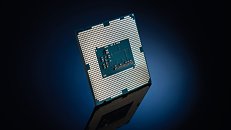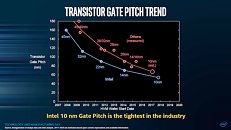Update: Intel has made an official statement on Twitter denying this and explaining that "Media reports published today that Intel is ending work on the 10nm process are untrue. We are making good progress on 10nm. Yields are improving consistent with the timeline we shared during our last earnings report."
Intel has been talking for years about the leap to the 10 nm process, a technology whose launch has been delayed time and time again. We were supposed to start seeing these microprocessors in 2016, but that date was postponed to 2017 and later to 2018. The manufacturer assumed the problems once again this year, but made a new promise: you will have 10 nm processors by the end of 2019.
The market seems to continue to trust Intel despite everything. Others, on the other hand, say that Intel is about to announce the total cancellation of this project. You have to take this news of Charlie Demerjian in SemiAccurate not with a grain of salt, but with a lot of grains of salt, because according to their sources, Intel would have already killed the process of 10 nm. This analyst has maintained the theory that Intel would never take that step, and in his analysis indicates that in his opinion this is the right decision. Evidently there has not been any official confirmation or comment from Intel, so for the moment Demerjian's statement raises many doubts and could be mere speculation.


In SemiAccurate they mention reliable sources that indicate that Intel has already taken this decision, which they welcome as being the most accurate despite the economic cost that such abandonment could cause in Intel. Demerjian not only reveals that Intel has decided to abandon this 10 nm process, but also adds that Intel's discourse has been deceptive all along: what it said publicly and its internal discourse were very different things.
Events at Intel don't help to clarify the situation. With Krzanich out, there is now new information that indicates Intel splitting manufacturing into three different segments. The problems with 10 nm silicon fabrication continue, and some analysts have mentioned how Intel is at least 5 years behind TSMC and may never catch up. On the other hand, recent reports give us (and their stock) some optimism, but the recent piece published at SemiAccurate shakes things up again.
View at TechPowerUp Main Site
Intel has been talking for years about the leap to the 10 nm process, a technology whose launch has been delayed time and time again. We were supposed to start seeing these microprocessors in 2016, but that date was postponed to 2017 and later to 2018. The manufacturer assumed the problems once again this year, but made a new promise: you will have 10 nm processors by the end of 2019.
The market seems to continue to trust Intel despite everything. Others, on the other hand, say that Intel is about to announce the total cancellation of this project. You have to take this news of Charlie Demerjian in SemiAccurate not with a grain of salt, but with a lot of grains of salt, because according to their sources, Intel would have already killed the process of 10 nm. This analyst has maintained the theory that Intel would never take that step, and in his analysis indicates that in his opinion this is the right decision. Evidently there has not been any official confirmation or comment from Intel, so for the moment Demerjian's statement raises many doubts and could be mere speculation.


In SemiAccurate they mention reliable sources that indicate that Intel has already taken this decision, which they welcome as being the most accurate despite the economic cost that such abandonment could cause in Intel. Demerjian not only reveals that Intel has decided to abandon this 10 nm process, but also adds that Intel's discourse has been deceptive all along: what it said publicly and its internal discourse were very different things.
Events at Intel don't help to clarify the situation. With Krzanich out, there is now new information that indicates Intel splitting manufacturing into three different segments. The problems with 10 nm silicon fabrication continue, and some analysts have mentioned how Intel is at least 5 years behind TSMC and may never catch up. On the other hand, recent reports give us (and their stock) some optimism, but the recent piece published at SemiAccurate shakes things up again.
View at TechPowerUp Main Site





